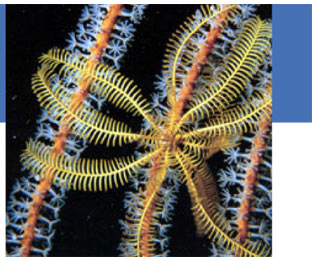Echinoderms: Part 8 - Feather Stars (Crinoidea)
Michael Paletta - Guest Author
They are the most primitive of the echinoderms, so much so that they only have a single opening that function as their "mouth" and "anus." This opening is located on the upper portion of their body. This configuration allows them to move the food, which they capture with their feathery arms, directly to their mouth and to expel waste so that the strong current in which they thrive in carries it away from their body. These animals have small "feet" called cirri, which they use to attach themselves to the reef. Once successfully perched in a spot, they expand their arms that act like nets to catch plankton and other foods as it passes across them on the reef. This behavior makes them appear like flowers or feathers blowing in the breeze. The lack of strong surge and adequate food is probably the main reasons why these animals tend to fail in captivity. On the reef, large quantities of organic particulate matter constantly move across the reef so these animals can readily obtain adequate nutrition. Replicating these conditions in a closed environment is very difficult since large amounts of food allowed to float in the aquarium can rapidly cause conditions to deteriorate. Furthermore, most systems do not have the water movement and surge that these animals seem to require. Evidence that these animals are not thriving is seen when these animals rapidly drop portions of their arms. In the wild, this is a natural defense mechanism and the arms rapidly grow back, but in captivity when the arms fall off very rarely do they grow back. Eventually all of the arms fall off and the animal has no means of capturing food and slowly starves to death. This happens in even the best systems where food is specifically given to these animals. Until we determine what is lacking for the proper care of these animals, feather stars should not be kept. They are one of the most difficult animals to keep with long-term success. Only experienced hobbyists willing to provide for their demanding needs should attempt keeping them. Even so, success is not guaranteed so most hobbyists should not try to keep them and they should only rarely be imported.
Part 8 of 8. Continue reading:
Biography Michael Paletta is the author of two books, "The Modern Marine Aquarium" and "Ultimate Reefs," and has acted as a consultant with the National Aquarium in Baltimore and the Pittsburgh Zoo Aquarium. |
||||||||||||
|
|




